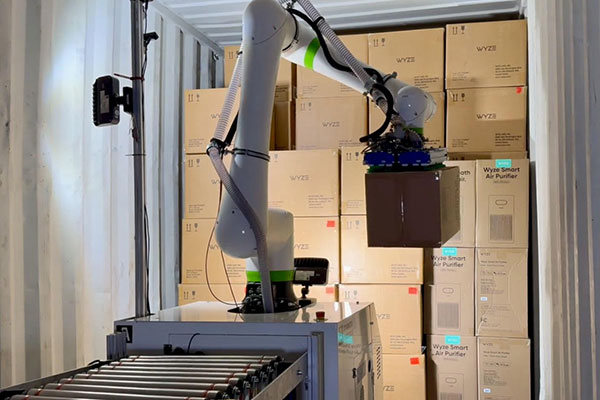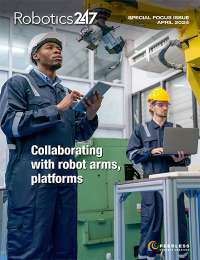Container- and truck-unloading robot developer Anyware Robotics recently announced it completed the first pilot of its Pixmo robot arm, with a commercial version planned for later in 2024.
Anyware also announced it will demonstrate Pixmo at MODEX 2024 in booth A11227. The trade show will be held March 11-14 in Atlanta, GA.
Anyware Robotics was founded in January 2023. The company raised $5 million in seed capital in March 2023, and said it is actively negotiating another round of funding to accelerate bringing Pixmo to market.
Anyware said its robot arms can autonomously unload boxes in containers and trucks more safely, cost-effectively, reliably, and quickly than manual methods. “Humans have been doing an admirable job in that heavy and demanding work, but there are too many injuries,” said Thomas Tang, CEO and co-founder of Anyware Robotics. “Pixmo can help to significantly reduce those injuries while improving the throughput of the logistics operations.”
Pixmo’s AI and machine learning enable no-code deployment
Anyware’s Pixmo robot arm combines an autonomous mobile robot (AMR) base, a cobot arm with six degrees of freedom, a vacuum-powered end effector designed for case handling, and AI-powered machine vision. With a mobile base that has the footprint of a regular pallet, the Pixmo robot can move in any direction to create the best handling position for the robot arm, both in and outside the container, said Anyware. Pixmo uses a force-sensing robot arm for unloading, which Anyware said allows the cobot to work safely around human employees.
Pixmo is built on an AI software stack that combines perception algorithms, learning-based motion planning, and a data generation pipeline for machine learning and AI training. Pixmo can be deployed within days on-site, adjusting and learning on-the-fly without software integrations or infrastructure changes, said Anyware. The robot can recognize SKUs, box orientation, size, and condition, and handle boxes that shifted during transit.
Anyware said Pixmo’s flexible form factor means the robot can also be used for a variety of tasks with additional software provided through over-the-air updates. These applications may include palletizing, depalletizing, case picking, and container loading.
Pixmo pilot programs to transition into commercial deployment
Anyware said it recently completed its first pilot with an import deconsolidation business that manages 21 warehouses in the U.S., which led to sales conversions of Pixmo robots. Anyware is currently running pilot programs with various companies in the U.S. and announced it will run multiple upcoming pilots, including one with a global third-party logistics provider.
The commercial version of Pixmo is scheduled to be available in the summer of 2024. It will be available via direct purchase or robotics-as-a-service (RaaS) models, for scaled deployment.
Anyware said its Pixmo systems are ideal for unloading at transload facilities, cross docks, third-party logistics providers (3PLs), distribution centers, and e-commerce fulfillment warehouses.
Article topics
Email Sign Up














